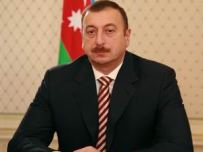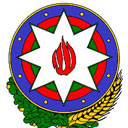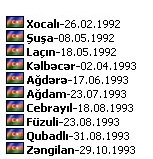 In accordance with the Constitution, the Azerbaijan state is a
presidential republic in form. The most important political and legal,
as well as ethical basic foundations of the Constitution in terms of
status, election and plenary powers of the President are as following:
In accordance with the Constitution, the Azerbaijan state is a
presidential republic in form. The most important political and legal,
as well as ethical basic foundations of the Constitution in terms of
status, election and plenary powers of the President are as following:
The President is the head of the Azerbaijan state; he represents the state in the country and in foreign relations (Article 8, part I) and is the Commander-in-Chief of the armed forces of the country (Article 9). These constitutional norms are supported by the moral maxims under which the Presidential power embodies the unity of people and secures the principle of succession of power (Article 8, part II). The principle of political security is reflected in the wording: "The President is the guarantor of the independence and the territorial integrity of the Azerbaijan state” (Article 8, part III). In addition, being the head of the executive power (Article 99), the President guarantees on behalf of the state observance of the concluded international agreements (Article 8, part III). The head of the state guarantees the independence of the judiciary (Article 8, part IV).
The legitimacy of the presidential power is provided by the nation-wide elections and the Constitution establishes certain restrictions for the candidates to the highest state position at that. There have been introduced the following requirements: age requirement – no younger than 35 years; residential qualification – no less than 10 years of continual residency; educational qualification – higher education; moral requirement – absence of previous convictions; political qualification – absence of dual citizenship (Article 100). According to the constitutional norm nobody can be elected to this highest position more than two times running, all in all no more than 10 years (Article 101). The ritual and symbolic moment of the highest power is reflected in the textually fixed swearing of an oath which is to be taken by the person who is elected President within three days from the day of announcement of the results of the election (Article 103). Inviolability of the highest power in the person of the President is complemented by the requirement of protection of his honour and dignity (Article 106, parts I, II).
The Constitution provides a broad range of powers for the head of the state. They are reflected in 32 provisions of Article 109. The President has the right to cancel the decisions of the Cabinet of Ministers, to dismiss the cabinet, excluding the Prime Minister whose resignation, as in the case of the Prosecutor-General, requires conducting conciliation with Milli Majlis. The President submits a proposal on appointment of the judges of the Constitutional Court, Supreme Court and Court of Appeal, and the members of the board of the National Bank of the Republic of Azerbaijan.
Being the Commander-in-Chief, the President appoints to and dismisses from the post the highest officers of the Armed Forces. The head of state forms his Executive Office and appoints its chief. The President submits the state budget and the military doctrine of the Republic of Azerbaijan to the legislative body, approves the state social and economic programs, sets up the central and local bodies of the executive power, designates referendum, signs and promulgates the laws. The President adopts decisions on the issues of citizenship, grants asylum, grants acts on amnesty and call-up to the active military service and transfer to the reserve of the armed forces personnel, confers upon the state awards, confers the highest military ranks and highest special ranks, declares general or partial mobilisation as well as demobilisation. Being the guarantor of the observation of international agreements, the President concludes inter-state and inter-governmental agreements, submits inter-governmental agreements to the Milli Majlis for ratification and denunciation, and undersigns decrees on the confirmation of international treaties.
The issues of the national security are resolved by the President on the basis of the powers provided for him by the Constitution. The President sets up the Security Council of the Republic of Azerbaijan, proclaims a state of emergency and martial law and by approbation of Milli Majlis declares war and makes peace. The President may submit a proposal to Milli Majlis on the involvement of the Armed Forces in assignments not directly connected with their duties. The solution of the issues which are not attributed to the Milli Majlis by the Constitution and juridical bodies of the Republic of Azerbaijan are stipulated to be within the power of the President.
















 © 2026 |
© 2026 | 